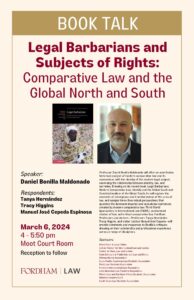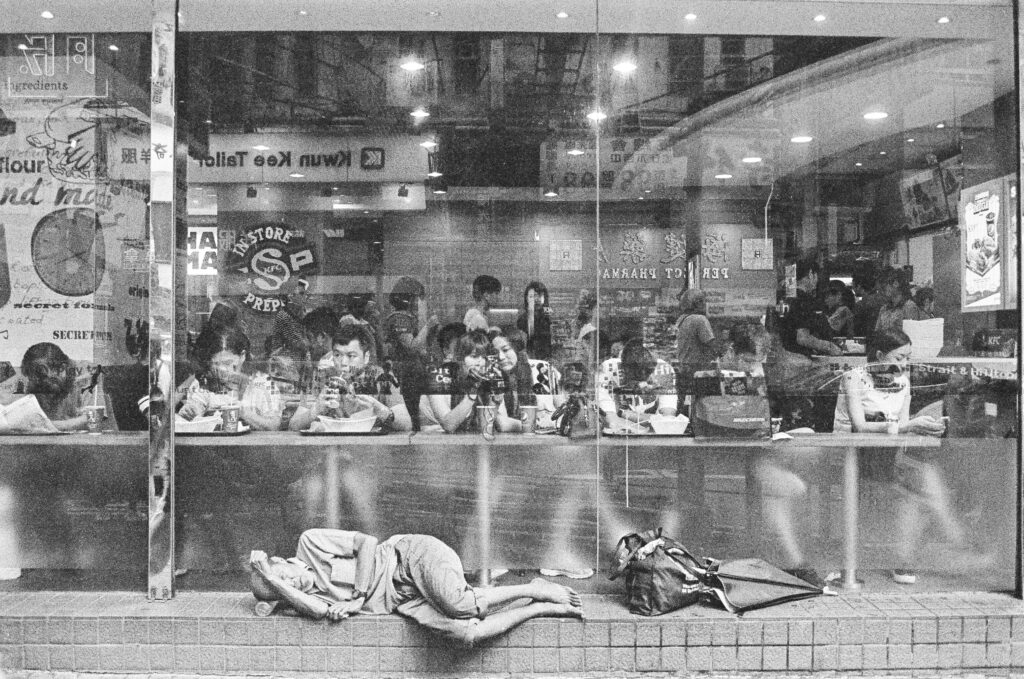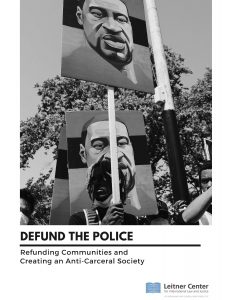Founded in 1996, the Crowley Program at the Leitner Center for International Law and Justice is one of the oldest human rights experiential learning programs at a law school in the United States. Providing a unique opportunity to engage in hands-on learning in international law for Fordham law School students, Crowley Scholars undertake fact finding, legal analysis, research, workshop building capacity sharing, and related work to prepare them for a career in international human rights.
Author: admin
Event: Legal Barbarians and Subjects of Rights: Comparative Law and the Global North and South
 March 6, 2024
March 6, 2024
4-5:50pm
Moot Court Room
Professor Daniel Bonilla Maldonado will offer an unorthodox historical analysis of modern comparative law and its connections with the identity of the modern legal subject, examining the relationship between identity, law, and narrative. Drawing on his recent book, Legal Barbarians: Modern Comparative Law, Identity and the Global South and Constitutionalism of the Global South, he will explore the moments of emergence and transformation of this area of law, and analyze three theoretical perspectives that question the dominant imperial and neocolonial narratives created by modern comparative law: Third World Approaches to International Law (TWAIL), postcolonial studies of law, and critical comparative law. Fordham Professors and visitors–Professors Tanya Hernández, Tracy Higgins, and visitor Justice Manuel José Cepeda–will provide comments and responses to Bonilla’s critiques drawing on their scholarship and professional experience across a range of disciplines.
Reception to follow.
Sponsored by:
Bellet Chair in Legal Ethics
Leitner Center for International Law and Justice
Center on Race, Law and Justice
Stein Scholars in Public Interest Law & Ethics
African Alumni Association
Asian Pacific American Law Students Association
Black Law Students Association
Fordham International Law Association
Latin American Law Students Association
National Lawyers Guild
South Asian Law Students Association
Hong Kong’s shifting political landscape exacerbates the unseen struggles of migrants

Hong Kong’s shifting political landscape exacerbates the unseen struggles of migrants
NEW YORK/HONG KONG (December 15, 2023) – Degrading human rights protections in Hong Kong are having a disproportionate impact on migrant domestic workers, immigration detainees, refugees and asylum seekers, and migrant children, a new report from the Leitner Center argues.
This is exacerbated by the silencing of Hong Kong’s once vibrant civil society amid a shifting political landscape and the chilling effect of the Beijing-imposed National Security Law, which is restricting civil liberties, democracy and freedom of speech.
“Unseen struggles: Addressing migrant rights in Hong Kong” explores this hidden plight and recommends how human rights can be upheld to improve the well-being of hundreds of thousands of people.
Migrant domestic workers
Migrant domestic workers are critical to Hong Kong’s economy. The city’s professionals rely on these poorly paid migrant domestic workers to raise their children, care for their aging parents, cook their food and clean their homes, enabling them to work full-time.
Yet these workers, who are 98.5 percent women, are often overworked, abused and exploited. Around one in six have experienced forced labor or been trafficked, according to a 2016 survey. Issues such as these remain undetected, with migrant domestic workers often remaining unwilling to report abuse due to fears of losing their jobs.
These women suffer from long and unregulated working hours and a minimum monthly salary of HK$4,730 (US$600) – a fraction of the minimum wage for other workers. Meanwhile, unscrupulous recruitment agencies charge exorbitant fees, leaving many migrant domestic workers in debt bondage, unable to escape potentially abusive employers.
Refugees and asylum seekers
Refugees in Hong Kong can apply for protection against return to their home country if they are at risk of ill-treatment, but few of these cases are accepted under the government scheme.
Between March 2014 and July 2023, 22,744 individuals sought protection from persecution and conflict in Hong Kong. Of these, just 301 were approved, with the rest facing removal from Hong Kong. The Immigration Department applies an unreasonably high threshold for people giving evidence of the threats of abuse they face in their home country.
While cases are ongoing, claimants receive basic government support, designed only to prevent destitution. Some go without food, shelter or medical care, and most live in overcrowded, unsanitary accommodation.
Immigration detainees
Most refugees and asylum seekers will face immigration detention in Hong Kong. The system allows for prolonged, indefinite confinement in poor, often prison-like conditions where no independent body oversees the facilities.
Detainees experience excessive handcuffing, solitary confinement, inadequate health care, and little privacy, with widespread CCTV use, including in bathrooms and cells. Despite laws safeguarding these rights, there is little opportunity to communicate confidentially with the outside world.
“This is supposed to be a non-punitive facility, but when they are taken to hospital … they are handcuffed to the bed,” an interviewee told the report’s researchers.
Marginalized migrant children
Hong Kong’s marginalized migrant children cut across all the above groups. They live in a legal quagmire where access to education and anything beyond basic health care is difficult. They struggle to find their place in a society that frequently overlooks their needs and rights, treating them as outsiders. This leaves them enduring poverty and instability for protracted periods.
Even when children can attend school, these institutions often fail to meet language needs and discriminate on religious or ethnic grounds.
Hong Kong must act to improve the lives of migrants
Hong Kong can improve the conditions for marginalized migrants. It can enact stronger laws that protect migrant domestic workers by paying them fairly and making it easier to escape abusive employers. It can ensure refugees are adequately protected and issued residence permits in line with international standards. Immigration detention centers can better safeguard detainees’ rights, and alternatives to incarceration can be used. The Government must guarantee that all children can access appropriate education, health care, and support to ensure an adequate standard of living
Martin Flaherty, Faculty Co-Director of the Leitner Center, said: “Marginalized migrants face not only the broader issues affecting Hong Kong, such as the erosion of civil liberties and human rights abuses, but also systemic challenges like poverty, homelessness, and limited access to justice and health care services. Compounding their issues is a legal system that contributes to their discrimination and exploitation, and does not comply with international standards.
“It is telling that a report on human rights issues in Hong Kong was hindered by the ongoing repression of civil society and individual rights in the city. If the climate of fear that hangs like a dark cloud over the islands of Hong Kong were not there, more advocates on these issues would undoubtedly be willing to speak out and enable change.
“Not only does the Hong Kong Government need to enact legislation to improve the lives of marginalized migrants, but it also needs to eliminate the laws, policies and practices that have caused people to silence themselves.”
—
A representative from the Leitner Center is available for interview.
Please find photos to use in reporting here (photo credit: “(c) The Leitner Center”).
A Chinese translation of this news release is available here.
About the report
The report was based on interviews, research, and freedom of information requests to the Hong Kong Government. Earlier in 2023, the Leitner Center made a submission to the United Nations Universal Periodic Review focusing on the rights of marginalized migrants and made specific recommendations to support greater respect for dignity and rights. This report expands on that submission. Interviewees for the report remain anonymous.
Media contact
+959959481869
About The Leitner Center
The Leitner Center for International Law and Justice at Fordham Law School trains law students to become international legal experts and impassioned human rights advocates through its pioneering human rights programs, clinics, and education initiatives; facilitates capacity building and advocacy with local social justice organizations and activists around the world; and contributes to critical research among scholars in international human rights. In particular, in cooperation with in-country partners, the Leitner Center works extensively in partnership with civil society organizations to support vulnerable populations, including in China. The Leitner Center respectfully presents this report to support and expand on its Stakeholder Submission in advance of China’s upcoming Universal Periodic Review (UPR) in the 45th session.
香港政治形勢的變化加劇移民群體看不見的掙扎

紐約/香港 (2023年12 月15日) — 萊特納研究中心一新報告稱,香港退化的人權保護對於外籍傭工、入境羈留人士、難民、尋求庇護者及來港移民兒童有不成比例的影響。
變動的政治形勢下香港一度活躍的公民社會被噤聲,北京施加的國安法產生的寒蟬效應限制了公民自由、民主與言論自由,進而加劇了上述對外籍傭工、入境羈留人士、難民、尋求庇護者及來港移民兒童的不利影響。
《看不見的掙扎:正視香港的移民權利》探究了這一隱藏的困境,並對如何捍衛人權以提升數十萬人的福祉提出建議。
外籍傭工
外籍傭工對於香港經濟至關重要。這座城市的工作者們依賴工資微薄的外籍傭工為他們養育孩子、照顧年邁父母、做飯、打掃房屋,使他們能夠全職工作。
然而這些外籍傭工——其中百分之98.5為女性——經常過度勞累並被虐待和剝削。 2016 年的一項調查顯示,大約六分之一的外籍傭工經歷過強迫勞動或人口販運。由於外籍傭工常因擔心失去工作而不願舉報虐待行為,此類問題往往仍不被發現。
這些女性遭受極長、不受監管限制的工作時間,以及4730港元(600美元)的極低月薪——這僅是其他工作者最低工資的一小部分。與此同時,無良招聘機構收取高額費用,使許多外籍傭工陷入債務束縛,無法逃脫可能會實施虐待的雇主。
難民與尋求庇護者
在香港的難民如果有遭受虐待的風險,可以申請保護以免返回原居地,但政府機制下被接受的申請極少。
自2014年3月至2023年7月,有22,744人在香港尋求庇護,以免被迫害或遭受衝突。其中只有301人獲得許可,其餘則面臨被驅逐出境。申請人須提供證據證明其在原居地面臨被虐待的危險,對此,香港入境事務處設置了不合理的極高標準。
在其申請案件被審理期間,申請人只能獲得僅旨在防止其陷入極端貧困的基本政府津貼。有些人沒有食物、住所或醫療服務;大多數人生活在過度擁擠、不衛生的住所中。
入境羈留人士
香港的大多數難民和尋求庇護者會面臨入境羈留。該羈留體系容許在惡劣、通常類似監獄的條件下經久、無限期的監禁,同時缺乏獨立機構對羈留設施進行監督。
被羈留人士會經受過度手銬、單獨監禁、醫療服務不足和隱私匱乏等問題,並處於廣泛的、包括浴室和牢房在內的閉路電視監控之下。儘管有保障權利的法律存在,被羈留人士沒有機會與外界進行保密溝通。
“這本應是一個非懲罰性機構,但被羈留人士在被送往醫院時是被銬在床上的。”一受訪者如是告知報告研究員。
被邊緣化的來港移民兒童
被邊緣化的來港移民兒童處於上述所有群體之中。他們生活在法律的泥沼中,很難獲得教育和基本醫療服務以外的任何服務和資源。在一個頻繁忽略其需求和權利、將其視為外來者的社會裡,這些兒童難以找到屬於自己的空間,致使他們忍受曠日持久的貧窮和動盪。
即便這些兒童可以上學,教育機構往往無法滿足其語言需求,且基於宗教或種族歧視他們。
香港必須採取行動改善來港移民的生活
香港可以改善被邊緣化的來港移民的生存條件。其可以制定更強有力的法律保護外籍傭工,支付更公平的薪資並使其更容易逃離施虐的雇主。香港可以與國際標準保持一致,確保難民被充分地保護並被發放居留許可。入境羈留中心可以更好地保障被羈留人士的權利,並使用監禁以外的替代選擇。政府必須保證所有兒童都能獲得正當的教育、醫療服務和支持,以確保其享有所需之適當生活程度。
萊特納研究中心的學院聯席主任Martin Flaherty稱:“被邊緣化的移民不僅面臨影響香港的更廣泛問題(例如被侵蝕的公民自由和被侵犯的人權),還面臨著諸如貧困、無家可歸、獲取司法救濟和醫療服務受限等系統性挑戰。一個助長對他們進行歧視和剝削的法律體系使這些問題更加複雜化,並且不符合國際標準。
“一個有關香港人權問題的報告因香港對公民社會和個人權利的持續打壓而受到阻礙,其本身就能反映現實。如果沒有烏雲般籠罩在香港島嶼上空的恐怖氣氛,更多支持這些議題的人無疑會願意發聲並推動變革。
“香港政府不但需要立法改善被邊緣化移民的生活,還需要廢除導致人們自我噤聲的法律、政策和做法。“
—–
萊特納研究中心的一位代表可以接受採訪。
請在此處查找用於報導的照片:(圖片來源:“(c) 萊特納研究中心”)。
關於本報告
該報告信息基於採訪、調研以及向香港政府提出的資訊自由要求。萊特納研究中心早先已於2023年中向聯合國人權理事會普遍定期審議機制提交書面材料,重點關注被邊緣化移民的權利,並提出了具體建議,以支持對人格尊嚴和權利的更大尊重。本報告對該提交材料進行了擴展。報告的受訪者保持匿名。
媒體聯繫人
+959959481869
關於萊特納研究中心
福特汉姆法学院的萊特納國際法與公義研究中心透過其開創性的人權項目、診所和教育舉措,培養法學生成為國際法專家和熱忱的人權倡導者;協助世界各地的社會正義組織和活動家進行能力建設和宣傳;並為國際人權領域學者的批判性研究做出貢獻。具體而言,萊特納中心與當地夥伴合同協作,透過夥伴關係與公民社會組織廣泛合作,以支持弱勢群體,包括在中國的弱勢群體。萊特納中心謹此呈現此報告,以支持和擴展其在即將舉行的、包含對中國普遍定期審查在內的第45屆會議前提交的利益相關者材料。
Leitner Center Stakeholder Submission Highlights Migrant Rights for China’s UPR
November 23, 2023
Geneva, Switzerland
In advance of China’s Universal Periodic Review — a human rights process to which all countries are subjected on rotating basis — the Leitner Center provided a stakeholder submission focusing on the rights of marginalized migrants in Hong Kong. This will be the fourth cycle of review for China; the Leitner Center previously submitted a report for China’s review in 2018.
While civic space in general in Hong Kong has been decreasing since the introduction of the National Security Law (NSL) in 2020, marginalized groups are especially vulnerable to limits on fundamental rights. The Leitner Center’s submission focuses on marginalized migrants, specifically: migrant domestic workers (MDWs), people seeking international protection (refugees/ non-refoulement claimants), detained migrants, and children of migrant backgrounds.
This submission was based on consultation with key stakeholders on the ground in Hong Kong, and will expand on its findings in a forthcoming report: Unseen Struggles: Addressing Migrant Rights in Hong Kong.
The Leitner Center urges states to focus on the following key recommendations during China’s UPR for implementation in Hong Kong:
- Migrant Domestic Workers: Reform employment regulations to eliminate the “two-week” rule and “live-in” rule, align minimum hourly wage for MDWs with other workers, raise the minimum allowable wage and food allowance to adequate levels, and eliminate any requirements that prevent MDWs from leaving abusive employers or restrict their access to financial services.
- Refugees / non-refoulement claimants: Recognize and protect people fleeing persecution as asylum seekers and refugees by extending application of the 1951 Refugee Convention and 1967 Protocol to Hong Kong, and granting protection, residence permits, and other rights in accordance with international law.
- Migrant detention: Introduce a time limit on immigration detention in line with international standards; establish robust monitoring mechanisms to safeguard detainee rights; implement community-based alternatives to immigration detention; and prohibit detention of people at heightened risks of harm or prolonged arbitrary immigration detention, including children, pregnant women, survivors of trafficking or torture, LGBTQI+ individuals, and stateless people.
- Migrant children: Grant residence permits to asylum-seeking and refugee children; reform laws which contribute to children of migrant domestic workers being separated from their mothers; ensure all migrant children can access essential support, appropriate education, and all their rights under the Convention on the Rights of the Child and other international law.
The UPR is set for early 2024. States are gathering in Geneva next week for the pre-session to the review.
Leitner Center Releases Report: “The World Simply Gave Up”: International Law and the Role of Non-State Entities in Humanitarian Evacuations in Afghanistan
(New York, USA and Brussels, Belgium, September 20, 2023) – The Leitner Center for International Law and Justice released a new report today examining the role that non-state entities played in coordinating support and humanitarian evacuations for Afghans in the midst of foreign military withdraw from Afghanistan in August 2021. A project supported by four Fordham Law students in the 2022-2023 Crowley Program, and with support from the Konrad Adenauer Foundation (KAS) Rule of Law in Asia Programme, the research involved over a year of desk research and legal analysis as well as more than 40 interviews of private individuals, NGOs, lawyers, advocates, aid workers, and veterans, all of whom responded to requests for assistance to evacuate Afghan civilians. The report was launched at a hybrid event with a physical launch at the KAS offices in Brussels.
After the Taliban’s capture of Kabul on August 15, 2021, thousands of Afghan citizens gathered at Hamid Karzai International Airport (HKIA) seeking evacuation. The unexpectedly swift resumption of Taliban control meant widespread fear and panic among groups including former government officials, human rights defenders, journalists, the legal community, people from religious and ethnic minorities, the LGBTQI community, those who had worked for foreign governments and their organizations, and many others. The ensuing chaos at HKIA underscored the lack of preparation by foreign States and out of this confusion—compounded by an ISIS-K attack at HKIA on August 26, 2021—scores of volunteers from across the world rallied in response to requests for assistance to evacuate Afghan civilians.
The new report, “The World Simply Gave Up”: International Law and the Role of Non-State Entities in Humanitarian Evacuations in Afghanistan, provides a comprehensive review of International Human Rights Law (IHRL), International Refugee Law (IRL) and International Humanitarian Law (IHL) to document and examine the experiences of those volunteers. It seeks to shed light on the lived realities of evacuation processes; and the gaps that have been exposed by these experiences in terms of applicable laws, policies, and practices. Finally, it attempts to identify a series of guidelines to implement in advance of future instances where evacuations of civilians in the context of conflict may be necessary.
The Leitner Center came to this work as one of those non-state entities seeking to help coordinate information around humanitarian evacuations in August 2021, and Fordham Law students provided research for legal pathways into countries that evacuating Afghans could travel to, contributing to the PILnet Afghan Legal Aid and Pathways. As the evacuation chaos unfolded, it was clear that critical assessment and accounting for the failures on the part of State actors in Afghanistan was needed—even while global attention shifted to the humanitarian crisis in Ukraine. The research and resulting report aims to record the history of this period and the stories of those affected by conflict and crisis. It aims to identify recommendations that improve on policies and processes to prevent similar failures in the future.
Leitner Center Distinguished Scholar-in-Residence, Gay McDougall, awarded inaugural Nelson Mandela Award by the International Human Rights Section of the AALS
New York, NY (January 5, 2023) – The Leitner Center for International Law and Justice congratulates our colleague and Distinguished Scholar-in-Residence, Professor Gay McDougall, as recipient of the first Nelson Mandela Award given by the International Human Rights Section of the Association of American Law Schools (AALS) . The award is presented in recognition of her work as an outstanding law teacher and scholar who has “made an exceptional contribution to International Human Rights.” As always, we are immensely proud to work with Professor McDougall.
Professor McDougall will accept the award at the Annual Meeting of the American Association of Law Schools in San Diego, South California on, January 7. For those unable to attend in person, a zoom invite has been arranged, as follows:
Date: Saturday, January 7
Time: 12 p.m. PT/ 9 a.m. ET
Link:
https://us06web.zoom.us/j/85294739514?pwd=cGJJcTc2cGxENjg1TCswZmh2TjRDdz09
Password:
BAVender*5010
Below is the text of her commendation profile, provided courtesy of the International Human Rights Section of the American Association of Law Schools (AALS):
Few embody the values and spirit of Nelson Mandela as does Professor McDougall. After graduating from high school, she was the first African American student to integrate Agnes Scott College in Decatur, Georgia. After obtaining her J.D. and LL.M. and gaining legal experience, she worked on eliminating the apartheid system in South Africa. A South African publication explained what she did:
“Prof McDougall was perhaps most noted for her role in loosening the grip of apartheid. She led the Southern African Project for the Lawyers Committee for Civil Rights, where her tireless efforts challenged those who wanted to keep apartheid intact. Following the country’s liberation in 1994, Prof McDougall spent considerable time inside South Africa, helping to dismantle apartheid laws and assisted in overseeing the first democratic election in 1994. [She was one of five international members of South Africa’s Independent Electoral Commission, which successfully organized and administered that country’s first non-racial elections, which saw the election of Nelson Mandela.] She assisted thousands of political prisoners in South Africa and Namibia. In recognition of her tireless opposition to apartheid, Prof McDougall was invited to stand next to Nelson Mandela as he cast his ballot in the historical election that made him South Africa’s first democratically elected President.”
As Special Rapporteur to the UN Subcommission on the Prevention of Discrimination and Protection of Minorities, Professor McDougall presented a groundbreaking study on the issue of systematic rape and sexual slavery practices in armed conflict, calling for international legal standards for the prosecution of such acts.
She was the first person that the UN Human Rights Commission (now the UN Human Rights Council) appointed to the position of Independent Expert on Minority Issues. She was the first American to serve as a member of the UN Committee on the Elimination of Racial Discrimination and was reappointed last year by Secretary of State Antony Blinken as a member of that highly respected Committee. The Committee monitors member state compliance with the International Convention on the Elimination of All Forms of Racial Discrimination. (Deciding to appoint no one to this important human rights body, the Trump administration had refused to reappoint her to that position.)
Professor McDougall also established a non-state organization, the Commission on Independence for Namibia, made up of 31 distinguished policymakers, to thwart then-apartheid South Africa’s aggressive aims towards that country. She played a leadership role in the UN Third World Conference against Racism, held in Durban in 2001. In addition to her work with the United Nations, she served for over a decade as the executive director of Global Rights, an NGO, which collaborated with human rights advocates in ten countries around the world to develop their strategies for justice.
Professor McDougall graduated from Yale Law School and has an LL.M. from the London School of Economics in Public International Law. She also worked as an associate at Debevoise, Plimpton, Lyons & Gates for two years before joining the National Conference of Black Lawyers as general counsel and later pursuing other public interest law positions.
Since 2018, she has been a Distinguished Scholar in Residence at Fordham Law School. She had previously taught at Georgetown Law School as the Father Robert F. Drinan Visiting Professor in Human Rights, again at Fordham as the Mulligan Distinguished Visiting Professor of International Law, and at the Washington College of Law as a Distinguished Scholar in Residence. Her book, The First United Nations Mandate on Minority Issues, published by Brill, covers her work as the first UN Independent Expert on these issues.
In 1999, Professor McDougall was awarded a MacArthur Foundation Genius Fellowship for her work on behalf of international human rights; in 2011, she received the Butcher Medal from the American Society of International Law for her lifetime advocacy for civil and human rights; and in 2015, the Government of South Africa gave her the Order of O.R. Tambo Medal, their national medal of honor for non-citizens, for her contributions to ending apartheid.
We are honored to present the Nelson Mandela Award to Gay McDougall.
New Report – Multi-Sectoral Approach to Combat Domestic Violence: Guide for the Kuwaiti Government
November 23, 2021 – The State of Kuwait has made laudable progress in combating domestic violence through its implementation of Sustainable Development Goal 5 (“SDG 5”) on gender equality and women empowerment and by passing its first domestic violence legislation in August 2020. However, many victims/survivors still have limited access to services to address the detrimental consequences of domestic violence. In development with Kuwaiti partners, the Leitner Clinic designed a guide to help Kuwait achieve the objectives of SDG 5 and effectively implement its new domestic violence legislation. Through a non-carceral approach, the guide focuses on strengthening Kuwait’s capacity to prevent and respond to domestic violence by improving existing services, providing recommendations for new services, and training non-punitive state agencies.
The guide was researched and drafted by Leitner Clinic students Heather Cameron, Charly Frohwitter, Adriana Kranjac, Evan Richardson, and Jacob Setton. The project was co-supervised by SJD candidates Esra Alamiri and Maroun Maalouf and Clinic director Prof. Chi Adanna Mgbako.
An excerpt from the guide:
“The 2018 International Men and Gender Equality Survey – the Middle East and North Africa (“IMAGES MENA”) reveals gaps in gender equality and women’s and girls’ empowerment. The study found that sixty percent of men reported being abusive towards their wives. Additionally, more than eighty percent of men and twenty percent of women believe that a woman should tolerate violence for the sake of the family and saving a marriage.
As is evident from the IMAGES MENA study, many men and women uphold norms that perpetuate domestic violence and undermine Kuwait’s ability to achieve SDG 5.”
About the Global 16 Days Campaign of Activism against Gender-Based Violence.
Pathways to Practice: Careers in Environmental Law
|
|
New Leitner Clinic Report – Defund the Police: Refunding Communities and Creating an Anti-Carceral Society
 The defund the police/invest-divest movement envisions a future where all communities have enough government-funded resources to be healthy and safe from violence, including from state violence in the form of police brutality. The Walter Leitner International Human Rights Clinic has released a new report calling for reductions in police budgets and greater investments in social and economic community resources that will help communities thrive and increase public safety. The report highlights the long-standing efforts of grassroots organizers, activists, and service providers that provide concrete examples of holistic alternatives to policing in the form of reduction of police budgets and investment in social and economic resources for underserved communities, violence interrupter programs, police-free schools and restorative justice, mental health crisis intervention teams, drug decriminalization and harm reduction programs, state-sponsored reparations for survivors of police violence, transformative justice interventions for gender- based violence, decriminalization of sex work, and community bailout funds. In addition to highlighting some of the work, achievements, and challenges of anti-carceral advocates, the report also debunks misconceptions about policing in the United States and the failed promises of police “reform.”
The defund the police/invest-divest movement envisions a future where all communities have enough government-funded resources to be healthy and safe from violence, including from state violence in the form of police brutality. The Walter Leitner International Human Rights Clinic has released a new report calling for reductions in police budgets and greater investments in social and economic community resources that will help communities thrive and increase public safety. The report highlights the long-standing efforts of grassroots organizers, activists, and service providers that provide concrete examples of holistic alternatives to policing in the form of reduction of police budgets and investment in social and economic resources for underserved communities, violence interrupter programs, police-free schools and restorative justice, mental health crisis intervention teams, drug decriminalization and harm reduction programs, state-sponsored reparations for survivors of police violence, transformative justice interventions for gender- based violence, decriminalization of sex work, and community bailout funds. In addition to highlighting some of the work, achievements, and challenges of anti-carceral advocates, the report also debunks misconceptions about policing in the United States and the failed promises of police “reform.”
The report was researched and authored by Leitner Clinic students Shivangi Bhatia, Jay Brodska, Alex Forgione, Mirelis Gonzalez, and Abdulai Turay. The report was supervised and edited by Professor Chi Adanna Mgbako.





